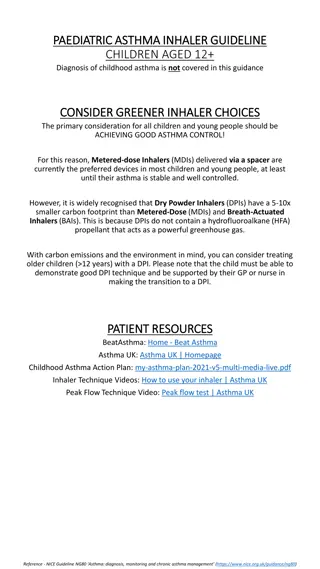
Understanding Asthma: Symptoms, Diagnosis, and Management
Learn about asthma, including when it can start, risk factors, diagnosing methods, testing procedures, different types, and tips for living with asthma. Understand the severity levels, symptom frequency, and how asthma can impact your daily life. Find out more to manage asthma effectively and improve your quality of life.
Download Presentation

Please find below an Image/Link to download the presentation.
The content on the website is provided AS IS for your information and personal use only. It may not be sold, licensed, or shared on other websites without obtaining consent from the author. If you encounter any issues during the download, it is possible that the publisher has removed the file from their server.
You are allowed to download the files provided on this website for personal or commercial use, subject to the condition that they are used lawfully. All files are the property of their respective owners.
The content on the website is provided AS IS for your information and personal use only. It may not be sold, licensed, or shared on other websites without obtaining consent from the author.
E N D
Presentation Transcript
Asthma Education 2 Photo Credit: https://www.aarc.org/nn19-helping-asthma-allergy-patients/
1. When can asthma start? a) At any age, you are never too young or too old to be diagnosed b) Between the ages of 5 and 10 c) When you are a teenager d) When you are an adult 2. True/False: It's possible to outgrow asthma as you get older. a) True b) False Module 2 Questions 3. Having which of the following increases your risk of developing asthma? a) Getting a cold b) Eczema and allergies c) Paper cuts d) Smoking 4. There are four levels of asthma severity. a) True b) False
Diagnosing Asthma Asthma can start at any age. If you are experiencing asthma symptoms, plan to see your doctor. Start Tell your doctor if anyone in your family has asthma. Asthma runs in families and will increase your risk. Tell A health care professional can diagnose asthma by assessing symptoms, physical examination, medical history, and spirometry which is a simple breathing test. Diagnose
Diagnosing Asthma You will be asked about your personal and medical history by your doctor. This information is essential in determining if your symptoms are asthma related. If you have any history of allergies or eczema you are at an increased risk for developing asthma. You are also at an increased risk for asthma if anyone in your family has asthma, allergies or eczema. Tell your doctor if you have been exposed to environmental factors that can exacerbate asthma, such as pet dander, smoke, dust mites and pollen.
Testing for Asthma Asthma can be caused by many different factors. Allergy Testing: An allergist can conduct skin or blood allergy tests to help determine if allergies may be contributing to the underlying causes of your asthma. Spirometry: This is a breathing test done in the clinic by respiratory therapist. The test tells the doctors what your lung's capacity is, how much air is moving in and out of your lungs, and among other things, how fast you can exhale. This will let the doctors know how well your lungs are functioning. Photo Credit: https://www.123rf.com/stock- photo/pulmonary_function.html?sti=nbjcuaxzxfof258yfd|&mediapopup=46401393
Different Types of Asthma Asthma has varying levels of severity. The severity of your asthma will be determined by the frequency of your symptoms and how often they interfere with your daily activities. Intermitten t symptoms < 2 days a week, sleep disturbance < 2 nights a month 1 Mild symptoms 2 days a week, sleep disturbance 2-4 nights a month 2 Persistent symptoms every day, sleep disturbance 1 night a week Moderate Persistent 3 Severe Persistent symptoms throughout the day, sleep disturbance every night 4
Living with Asthma Asthma can be treated, and symptoms can disappear as you get older, but they have the potential to return. It is important to develop an action plan for treatment and follow-up with your doctor. This is because symptoms can change as your immune system continues to develop throughout your life.
1. When can asthma start? a) When you are an adult b) Between the ages of 5 and 10 c) At any age, you are never too young or too old to be diagnosed d) When you are a teenager Module 2 Questions (re-visited) 2. True/False: It's possible to outgrow asthma as you get older. a) True b) False 3. Having which of the following increases your risk of developing asthma? a) Paper cuts b) Getting a cold c) Smoking d) Eczema and allergies 4. There are four levels of asthma severity. a) True b) False






















